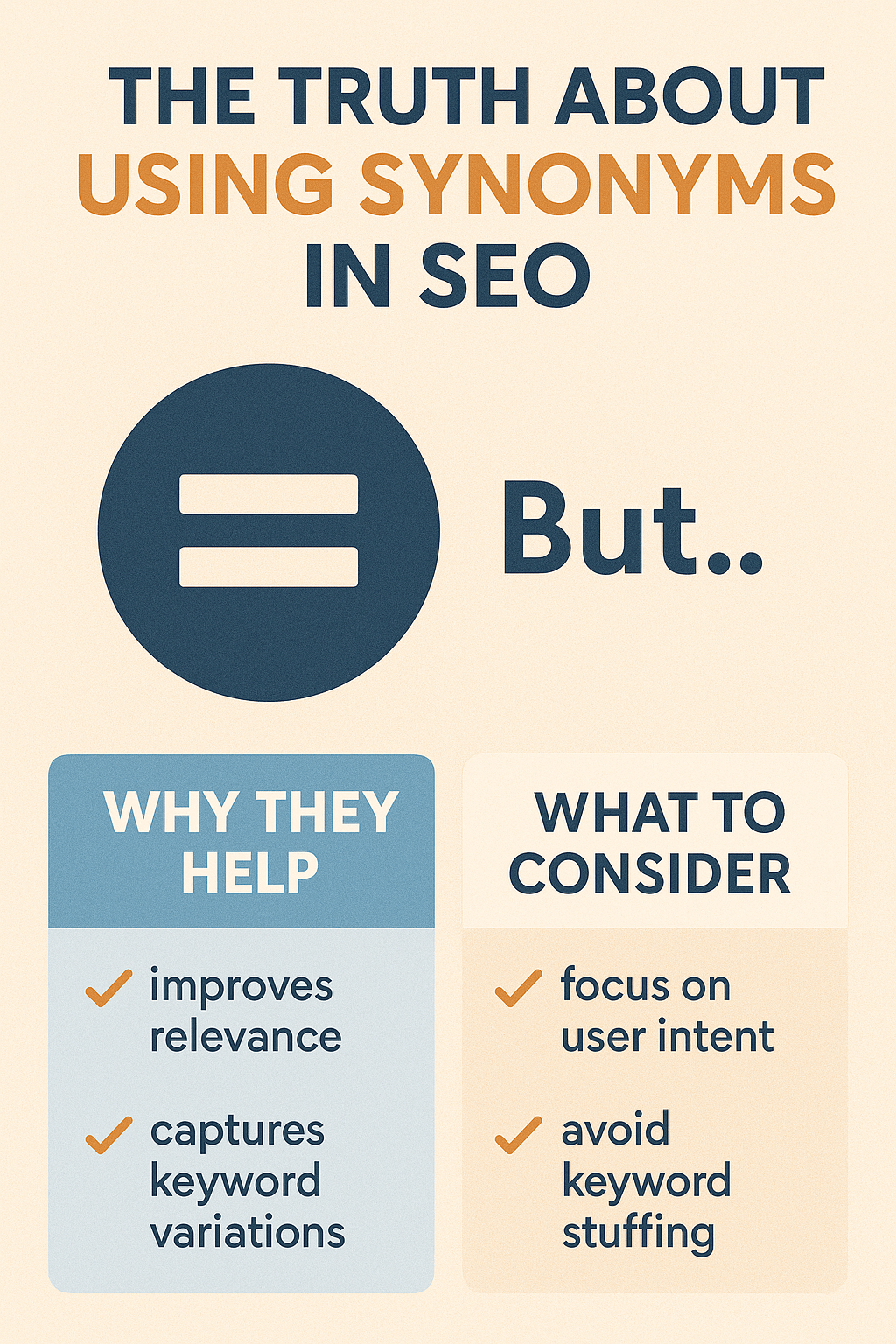Abdullah Usman
You’ve probably heard conflicting advice about synonyms in SEO. Some “experts” claim stuffing your content with every possible keyword variation will skyrocket your rankings, while others dismiss synonyms as completely irrelevant. After 8 years of providing SEO services to businesses just like yours, I’m here to cut through the noise and give you the real story.
The truth is more nuanced than either extreme suggests. Modern search engines, particularly Google, have evolved far beyond simple keyword matching. They now understand context, intent, and relationships between words through what we call Semantic SEO. This means your approach to synonyms can either supercharge your content’s visibility or leave you spinning your wheels with outdated tactics.
Whether you’re running an e-commerce store, managing a local business, or building your influence online, understanding how synonyms actually work in today’s SEO landscape could be the difference between page one rankings and digital obscurity.
How Search Engines Actually Process Synonyms Today
Google’s RankBrain algorithm, introduced in 2015 and continuously refined, processes over 15% of daily searches that have never been seen before. This AI system doesn’t just match exact keywords—it understands the relationship between different words and phrases that mean the same thing.
When you search for “running shoes,” Google knows you might also be interested in results about “athletic footwear,” “jogging sneakers,” or “workout shoes.” This understanding comes from analyzing billions of search queries and user behavior patterns. The search engine recognizes that users often use different terms to describe the same product or service.
This evolution means your content strategy needs to think beyond individual keywords. If you’re selling fitness equipment online, ranking for “home gym equipment” might also help you appear for searches like “workout gear for house” or “exercise machines residential.” The key is natural integration, not forced keyword stuffing.
For local businesses, this semantic understanding is particularly powerful. A restaurant optimizing for “Italian food downtown” might also capture searches for “pasta restaurant city center” or “authentic Italian cuisine urban area” when the content naturally incorporates related terms.
Why Keyword Stuffing with Synonyms Backfires
I’ve seen countless business owners make this mistake: they discover a list of synonyms and proceed to cram every variation into their content like they’re filling a keyword piñata. The result? Content that reads like it was written by a robot having a vocabulary seizure.
Google’s algorithms are sophisticated enough to detect this unnatural language pattern. When you write sentences like “Our premium quality high-end superior excellent products,” you’re not helping your SEO—you’re hurting it. The search engine recognizes this as an attempt to manipulate rankings rather than provide genuine value to users.
A 2023 study by Backlinko analyzing over 11 million search results found that pages with naturally flowing content outranked keyword-stuffed pages by an average of 40% in search results. The reason is simple: Google prioritizes user experience, and users prefer content that actually makes sense.
Instead of stuffing synonyms, focus on topical authority. If you’re writing about Shopify SEO, naturally mention related concepts like “e-commerce optimization,” “online store visibility,” and “product page rankings” where they add genuine value to your explanation. This approach signals expertise to both search engines and your human readers.
What Really Drives Rankings Beyond Basic Synonyms
The relationship between synonyms and rankings isn’t as straightforward as many business owners believe. While using varied terminology can help, it’s just one small piece of a much larger puzzle that includes technical SEO, user experience signals, and content depth.
Search intent matching trumps synonym usage every time. If someone searches for “SEO audit checklist,” they want a comprehensive list of items to review, not a philosophical discussion about search engine optimization auditing procedures. Your content should match what users actually want, regardless of how many synonyms you incorporate.
User engagement metrics play a crucial role in how synonyms impact your rankings. When visitors spend more time reading your content, have lower bounce rates, and interact with your pages, Google interprets these signals as indicators of quality and relevance. Synonyms only help if they improve the overall reading experience and comprehension.
Technical factors often outweigh synonym strategy entirely. A page that loads in 2 seconds with proper schema markup and mobile optimization will typically outrank a slower page stuffed with keyword variations. Your on-page SEO foundation must be solid before synonym optimization can make any meaningful difference.
The Smart Way to Use Synonyms for E-commerce Success
E-commerce businesses have unique opportunities to leverage synonyms effectively because product searches often involve multiple ways to describe the same item. Customers might search for “wireless headphones,” “Bluetooth earbuds,” “cordless audio devices,” or “hands-free headsets” when looking for similar products.
Create comprehensive product descriptions that naturally incorporate these variations while focusing on user value. Instead of listing “wireless cordless Bluetooth hands-free audio headphones earbuds,” write something like: “These wireless headphones deliver crystal-clear audio through advanced Bluetooth technology, giving you the freedom of cordless listening whether you prefer over-ear comfort or compact earbud design.”
Category pages present excellent opportunities for semantic keyword integration. Your “Women’s Athletic Wear” category might naturally mention “ladies workout clothes,” “female fitness apparel,” and “women’s gym clothing” throughout the description and product listings. This approach helps capture various search terms while maintaining readability.
Product reviews and customer-generated content often contain natural synonym usage that you can’t plan. Encourage detailed reviews where customers use their own language to describe your products. These authentic descriptions frequently include keyword variations that enhance your page’s semantic relevance without any forced optimization.
How Local Businesses Should Approach Synonym Strategy
Local SEO presents specific challenges and opportunities when it comes to synonym usage. Your potential customers might describe your services differently than you do, and understanding these variations can significantly impact your visibility in local search results.
Geographic synonyms matter more than many business owners realize. If you operate a restaurant in “downtown Springfield,” your customers might also search for “Springfield city center dining,” “central Springfield restaurants,” or “Springfield urban eateries.” Including these geographic variations naturally in your content helps capture more local search traffic.
Service-based businesses should pay attention to how customers actually describe what they need versus industry terminology. A plumber might offer “drain cleaning services,” but customers often search for “unclog sink,” “fix blocked pipes,” or “clear slow drain.” Your content should bridge this language gap while maintaining professional credibility.
Local business listings and citations benefit from consistent yet varied descriptions. While your core business information should remain identical across platforms, the additional description fields can incorporate natural synonym variations that help with discovery across different local directories and review sites.
Common Misconceptions That Hurt Your SEO Results
Many business owners operate under outdated assumptions about how synonyms impact search rankings. These misconceptions often lead to wasted effort and sometimes even harm their SEO performance.
The biggest myth is that using more synonyms automatically leads to better rankings. Quality and relevance matter infinitely more than quantity. A focused piece of content that thoroughly addresses one topic will typically outperform scattered content that tries to target every possible keyword variation.
Another common mistake is believing that synonyms can compensate for poor content quality or weak topical authority. If your content lacks depth, expertise, or genuine value to readers, adding synonyms won’t fix the fundamental issues. Search engines prioritize comprehensive, authoritative content over keyword manipulation tactics.
Some businesses assume they need to use every possible synonym in a single piece of content. This approach often results in repetitive, unnatural writing that hurts user experience. It’s better to distribute synonym usage across multiple related pieces of content that each serve specific user intents.
The assumption that exact match keywords always outperform synonyms is also outdated. Modern search algorithms understand that “best pizza delivery” and “top pizza delivery service” address the same user need. Your content should prioritize clarity and user value over rigid keyword matching.
Advanced Techniques That Actually Work in 2025
Successful synonym implementation in modern SEO requires strategic thinking beyond basic keyword swapping. The most effective approaches focus on user intent clusters and semantic relationships rather than individual word variations.
Topic clustering represents the evolution of synonym strategy. Instead of targeting isolated keywords, create content hubs that address related topics comprehensively. Your main article about “e-commerce SEO” might link to supporting content about “product page optimization,” “online store speed,” and “shopping cart abandonment”—all semantically related concepts that reinforce your topical authority.
Intent-based synonym groups help you understand when variations actually matter. Commercial intent searches like “buy running shoes” and “purchase athletic footwear” serve similar purposes, while informational searches like “how to choose running shoes” and “running shoe buying guide” address the same user need with different phrasing.
Latent Semantic Indexing (LSI) keywords work differently than direct synonyms. These are terms that frequently appear together in content about your topic. For “digital marketing,” LSI keywords might include “conversion rates,” “customer acquisition,” and “marketing funnel”—not direct synonyms but related concepts that add semantic depth.
Content gap analysis reveals synonym opportunities your competitors might be missing. Tools like SEMrush or Ahrefs can show which related terms drive traffic to competitor pages, helping you identify natural synonym opportunities that align with actual search behavior rather than theoretical keyword lists.
Measuring the Real Impact of Your Synonym Strategy
Tracking the effectiveness of synonym usage requires looking beyond simple ranking positions. The metrics that matter most reflect user engagement and business outcomes rather than just search visibility.
Organic click-through rates often improve when your content naturally incorporates varied terminology that matches different user search patterns. Monitor your Google Search Console data to see which queries actually drive clicks to your pages, not just impressions.
Time on page and bounce rate metrics reveal whether your synonym usage enhances or hurts readability. If adding keyword variations makes your content harder to read, these engagement metrics will decline, ultimately hurting your rankings despite any short-term gains.
Conversion tracking shows the business impact of your SEO efforts. Pages that rank for multiple related terms through natural synonym usage often attract more qualified traffic because they address various ways users express the same intent.
Long-tail keyword rankings frequently improve when you incorporate relevant synonyms naturally throughout your content. These longer, more specific searches often have higher commercial intent and lower competition, making them valuable targets for business growth.
Action Steps for Implementing Synonym Strategy Today
Start by auditing your existing content to identify opportunities for natural synonym integration. Look for repetitive phrasing where varied terminology could improve readability while maintaining your message clarity.
Research how your actual customers describe your products or services. Customer service transcripts, review feedback, and social media mentions reveal the language your audience actually uses versus your internal business terminology.
Create a semantic keyword map that groups related terms by user intent rather than alphabetical similarity. This approach helps you understand when synonyms serve the same purpose versus when they address different aspects of your topic.
Implement synonym usage gradually and measure the impact. Make changes to a few pages at a time, monitor the results for 4-6 weeks, then apply successful strategies to additional content based on actual performance data.
Focus on creating comprehensive, valuable content first, then enhance it with natural synonym usage that improves clarity and user experience. This approach aligns with search engine priorities while serving your business goals effectively.
The truth about synonyms in SEO is that they work best when they serve your users first and search engines second. By understanding how modern algorithms process semantic relationships and focusing on genuine value creation, you can leverage synonyms as part of a broader strategy that drives real business results.


